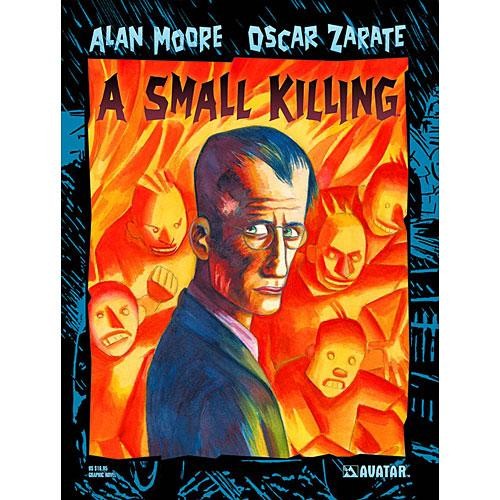7. Alan MooreA Small Killing

This is probably the best Alan Moore book, in terms of sheer consistency, because it was written as a piece. Unfortunately, it’s a format that never really took off. Everybody wants to do these giant 500-page bricks to make a serious comic book. But A Small Killing represents a completely different art form that nobody has really pursued. It’s essentially a novella. You really can’t get much better than it in terms of comic book storytelling and writing. It’s the work of a short story master, utilising a different form than any short story master has done before. It’s not Raymond Carver, it’s not Chekhov, it’s not Dostoevsky. It’s purely Alan Moore and it’s purely a comic book, that’s done on a level that nobody else has really attempted. Even the Neil Gaiman novellas, like Violent Cases or the Punch and Judy book [The Tragical Comedy Or Comical Tragedy Of Mr. Punch], they really don’t approach something like A Small Killing. They’re good but A Small Killing is really great.
It’s a paranoid fantasy that keeps revealing different layers of this ad executive’s life. It’s very sharp, page for page, the way that the story unfolds. There is a sense of revelation and unfolding mystery as you read it. The way that Alan Moore has of setting up the pins and then knocking them down – he’ll tie a little noose around the reader that you don’t even realise is there and then he’ll yank the rope. He’s constantly doing that, it’s part of his style. These little literary punchlines, that you never know quite where they’re coming from but when they hit you you realise that you’ve been set up. And every single page unfolds like that in a lot of his best work, whether it’s V For Vendetta or Watchmen or A Small Killing. The showmanship of it, the way that he’ll engineer these scenes and interactions so you’ll have these very satisfying and surprising outcomes. He’s a master craftsman.
A Small Killing is also so overlooked. Nobody ever really talks about that one. It’s finally back in print after a long time of being out of print. The way it was published at that time, for some reason it didn’t go anywhere. Alan Moore didn’t want any part of the mainstream comics world but he wasn’t part of the punk underground comics scene. When he severed himself from the mainstream Marvel and DC thing, he was really trying to find a third way. Some kind of independent comic publishing company that was in between an underground and a mainstream company, but that approach fizzled. So that’s why stuff like A Small Killing didn’t really fit in anywhere. It didn’t have the publicity or the fanbase. In that sense it was never pursued. It was considered a commercial flop and not that many people have read it. Also look at Big Numbers, which he never even finished, but would’ve been a similar sort of project, done for an independent company that’s not like a punk underground company. Big Numbers probably would’ve been this incredible piece of literary fiction that is completely unlike anything else that’s ever been done. It’s a weird tragedy of the way the industry was at that time that it couldn’t continue. But in the time period where he was doing Big Numbers, A Small Killing is the one complete work that you can see. Maybe Big Numbers would’ve been something like this, something that’s totally removed from a superhero context but a very moving and well-written human drama, even though there are supernatural elements in it.


